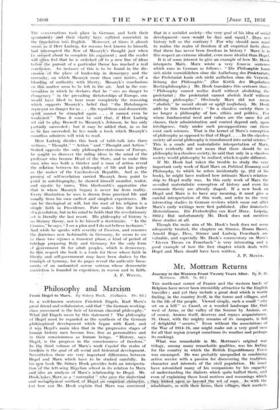Philosophy and Marxism
Froin Hegel to Marx. By Sidney Hook. (Gollariel. 10s. 6d.)
IN a well-known sentence Friedrich Engels, Karl Marx's great friend and collaborator, said that " the German working- class • movement is the heir of German classical philosophy." What did Engels mean by this statement ? The philosophy of -Hegel must be regarded as the synthesis of the German philosophical development which began with Kant, and it was Hegel's main idea that in the progressive stages of human history men become free, free as personalities and in their consciousness as human beings. " History, says Hegel,: is the progress in the consciousness of -freedom." In the third volume of Marx's 'work Capital the realm of freedein, is the goal of all social and historical development. Nevertheless there are very important differences. between Hegel and Marx which have to be studied carefully. In his new book Mr. Sidney Hook provides both an interpreta- tion of the left-wing Hegelian school in its relation to Marx and- ,iiiso" an analysis of Marx's relationship to Hegel. Mr. Hook, takes...Marx as a naturalist who gatrre the dialectical and metaphysical.method;
but how can Mr. Hook explain that Marx was convinced that in a socialist society—the very goal of his idea of social
development.-men-would :be .and equ,ati .....PAes not historY tell us the contrary ? For Why-Should -men want to realise the realm of freedom if all empirical facts show that there has never been freedom in history Marx: is in this respect an extreme idealist, even more idealist than Hegel. It is of some interest to giVe an example of how Mr. •Hook interprets Mirk. Marx wrote a. very famous sentence which runs in German as follows : " Die Philosephie kann sich nicht verwirkliehen ohne die Aufhebung des Proletariats; das Proletariat kann" sich nicht aufheben ohne die Vcrwirk- lichung der Philosophie." (Zur Kritik der Heg.44•Iten Rechtsphilosophie.) Mr. Hook translates this sentence thus : " philosophy cannot realise itself without abolishing. the proletariat ; the proletariat cannot abolish itself without realising. philosophy." Obviously Marx did not mean " abolish," he meant elevate or uplift (aufheben). Mr. Hook adds to this translation ; " In a classless society thee is no longer a philosophy of law, ethics and polities For where fundamental need and values are the same for all classes, their administration and control depend only _upon intelligence. Only under such presuppositions can there exist such sciences. That is the kernel of Marx's conception of philosophy as opposed to that of Hegel.. . In the classless society all social philosophy is transformed into social scieace:' This is a crude and materialistic interpretation of. Marx. Marx evidently did not mean that there should :be no philosophy in a classless society, he said that only in a elasSless society would philosophy be realised, which is quite different.
If Mr. Hook had taken the trouble to study the. very important early work of Karl Marx on Political Economy and Philosophy, to which he refers incidentally (p. 272 of his book), he might have realised how intimate Marx's relation- ship to Hegel really was. In this early work of Marx the so-called materialistic conception of history and even his economic theory are already shaped. If a new book on Hegel and Marx is to have any meaning, it must give a careful interpretation of this work, and refer to the very interesting studies in German reviews which came out after Marx's early writings were first published. (Der historiscle Materiaiismus. Die Friihsthrillen con Karl Marx. Leipzig, 1932.) But' unfortunately Mr. Hook does not mention these studies at all.
Though the main aim of Mr. Hook's book does not seem
adequately treated, the chapters on Strauss, Bruno .Bauer, Arnold Rage, Hess, Stirner and Ludwig Feuerbach are valuable, and especially Mr. Hook's commentary on Marx's " Eleven Theses en Feuerbach " is very interesting and a good example of how the first chapter which deals with Hegel and Marx should have been written.
J. P. AlAvEn.






















































 Previous page
Previous page